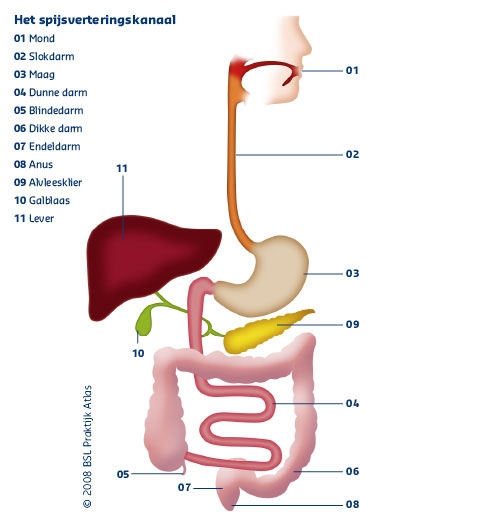Digestion
Food is our fuel. It provides energy, heat and growth substances. As with any machine it is important that you use the correct fuel.

(This will be true for Westerners who live long enough and have sufficiently food.)
Digestion refers to the decrease or degradation of food (nutrition) to substances which can be absorbed by the body.
Chewing and biting into pieces and grinding between the teeth is the first phase.
Mixing with enzymes such as amylase in the saliva already results in a transformation to break down starch. This creates maltose, a disaccharide that is converted back into glucose.
In the stomach, food is usually one to three hours saved. A heavy meal a little longer. Sometimes the stomach sends too much food or tainted food as soon as possible back via the esophagus.
The epithelial cells in the stomach lining produce hydrochloric acid (gastric acid, 8 to 15 ml of gastric juice per hour) and pepsinogen, a pro- enzyme. Under the influence of hydrochloric acid pepsinogen is converted in peptase, which ensures that proteins can be changed in a shorter polypeptides.
Through the acidic environment, a large part of the bacteria that came along with the food will be killed.
The stomach pulls together, thereby grinds fine and mixes the food with digestive juices.
The bileand bile duct debouch in the adjacent duodenum. The pancreas produces a day about a liter of fluid to ensure that the mass of acid from the stomach is neutralized. The enzymes in the fluid split fats, carbohydrates and proteins into even smaller particles.
In the six meter long small intestine are villi that absorb nutrients in the blood.
The colon ends the process by taking the last nutrients. Digested remains together with indigestible particles and especially dead intestinal bacteria give us still valuable manure.
From mouth to manure food usually has travelled 18 to 20 hours in normal conditions.
The once deemed unnecessary appendix acts as a secure repository for good bacteria. The body uses it for a restart of the digestive system after a bout of dysentery or cholera.
Our intestinal flora is composed of 100 to 600 different species of bacteria in the digestive tract (an average of 160, and up to 1,150).
The half of the weight of the contents in the colon consists of bacteria, with a total weight of up to half a kilogram. Our body contains ten times more bacteria than the number of human cells.
They provide the (further) break down of substances such as cartilage, tough fiber and long sugars, and for the synthesis of required substances such as vitamin K.
In exchange for their services our body offers bacteria food and shelter. We cannot live without each other. Bacteria form a strong ecosystem in the intestine.
Bioinformatic Jeroen Raes discovered that the intestines of every person belong to one of three clearly distinguishable types of intestinal microbiota, comparable to blood groups. Those types are independent of race, country of origin or nutrition: Bacteroides, Prevotella and Ruminococcus. Remarkably, the vitamin production between the different groups varies widely. Research into operation and effect of our intestinal flora has a long way to go.
The liver consists of 350 billion cells to defuse toxins, store a reserve glucose and iron, process proteins into amino acids or other proteins and producing bile... It is a very complicated and versatile chemical lab.
Take care of this: be moderate with alcohol, do not smoke, take plenty of exercise and fresh air for the necessary fresh oxygen. Avoid stress.
Tips to promote good digestion :
Eat more often, but less elaborate meals.
Chew enough (each bite 10 times).
Eat plenty of fiber (up to) five servings of fruits and vegetables per day.
Eat plenty of whole grain daily and / or legumes (chick peas, lentils).
Limit fried foods, fats and sugars.
Eat varied.
Do not drink too much at dinner, this dilutes gastric secretions too much.
Cold drinks (and ice) slow digestion so the food must remain longer in the stomach.
Drink lots of water, little caffeine and alcohol.
Take time to eat and chew properly and slowly.
Move sufficient. Do not smoke.
When I was little my parents told me I was diabetic to save money on candy.
Beware, chocolate makes your clothes shrink!
